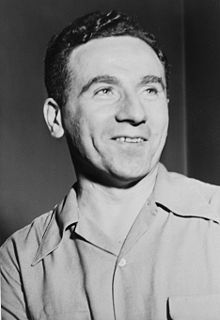

John Gates
| |
|---|---|

Gates in 1948
| |
| Born | Solomon Regenstreif (1913-09-28)September 28, 1913
New York City, U.S.
|
| Died | May 23, 1992(1992-05-23) (aged 78)
Miami Beach, Florida, U.S.
|
| Occupation | Businessman |
| Political party | Communist Party USA |
| Spouse | Lillian Schwartz |
John "Johnny" Gates, born Solomon Regenstreif (28 September 1913 – 23 May 1992) was an American Communist business man, best remembered as one of the individuals spearheading a failed attempt at liberalization of the Communist Party USA in 1957.
Solomon Regenstreif, better known by the Anglo-Saxon name he later adopted, John Gates, was born in 1913 in New York City, the son of ethnic Jewish parents who hailed from Poland.[1]
Active in the campaign to free the Scottsboro Boys, Gates left college prior to graduation so that he could pursue his radical political activism. Gates first worked with unemployed workers in Ohio, eventually running unsuccessfully for the city councilofYoungstown.[1]
When the Spanish Civil War broke out, Gates joined the Abraham Lincoln Brigade and fought in Spain. In March 1938, at the age of 24, Gates rose to the rank of battalion political commissar of the Lincoln-Washington Battalion. In this capacity, Gates gained a reputation as a strict disciplinarian. He later admitted he had gone somewhat overboard. In 1938, he was involved in the controversial decision to execute a deserter named Paul White who had left the lines before having a change of heart and returning, only to be executed for disciplinary reasons. The decision caused great dissension in the Lincoln Brigade's ranks, forcing the immediate declaration that no further executions would take place.[2]
Returning to the United States from Spain, Gates became the head of the Young Communist League.
The week after the Japanese attack on Pearl Harbor in December 1941, Gates enlisted in the American armed forces.[3]
In the summer of 1948, Gates was one of 12 "kingpin Commies" (to borrow a colorful contemporary turn of phrase from Time magazine) indicted under the Smith Act for being "dedicated to the Marxist–Leninist principles of the overthrow and destruction of the Government ... by force and violence."[4] Although the Smith Act had been implemented eight years earlier at the time of the Molotov–Ribbentrop Pact for the altogether different purpose of fighting potential infiltration of America by secret Nazi and Communist saboteurs, at the height of the Cold War the existing law was used as a tool against national officials of the Communist Party. Prosecution of the ailing 67-year-old William Z. Foster was eventually dropped, but Gates and ten others were convicted in 1949 and sentenced to five years in prison.
Following his release from prison in 1955, Gates was appointed as editor of the Communist Party's newspaper, The Daily Worker. In that capacity, Gates' editorial policy soon came to set him at odds with the Party leadership, he took liberal positions embracing Nikita Khrushchev's criticisms of Stalin and opposing the Soviet Union's suppression of the 1956 Hungarian Revolution. Party leaders were particularly upset by his support of Howard Fast, a prominent writer who was quite critical of the Soviet Union and soon after also left the Communist Party.
However, The Daily Worker was in deep trouble with significant losses in circulation due to a general disenchantment with communism, by both workers and intellectuals, and pressure from McCarthyism. Confronted with deep deficits and its inability to control Gates, on December 22, 1957, the Party suspended publication of the paper as a daily, the last daily issue appearing January 13, 1958.
Gates resigned from the Party in January 1958, claiming that it had "ceased to be an effective force for democracy, peace, and socialism in the United States." He set to work writing his memoirs, The Story of an American Communist, tapping fellow ex-Communist pariah Earl Browder to write the book's introduction.
In a January 18, 1958, television interview with Mike Wallace, Gates attempted to illuminate his interlocutor on the nature of the power relationship between the Communist Party of the Soviet Union and the American Communist movement:
[Y]ou have to understand how and why [the CPUSA] followed [Moscow's] line. It's not a matter that someone gave orders over there and we followed it over here. It's much more subtle than that. We followed that line because we thought it was right. It's more or less like a relationship between two people. One is an aggressive, brilliant personality and the other worships that person, and that person becomes sort of an idol for him and he tends to imitate and ape everything that he does. Well that kind of relationship is a bad relationship for both people."[3]
Gates cited the American Communist Party's failure to declare its independence from Moscow as decisive in his decision to leave the organization.
Following publication of his memoirs, Gates went to work as a senior research assistant for the International Ladies Garment Workers Union (ILGWU). In this capacity, Gates helped members with workers' compensation, unemployment, and Social Security claims. He retired from the union in 1987.[1]
Johnny Gates died on May 23, 1992, in Miami Beach, Florida, at the age of 78. He was survived by his wife of 47 years, the former Lillian Schwartz; a brother, Nat Regenstreif, of Hollywood, Florida, and three sisters, Blanche Smiles of the Bronx, Irene Travis of Charlotte, North Carolina, and Marlene Seml of Boca Raton, Florida.[1]
| International |
|
|---|---|
| National |
|
| Other |
|